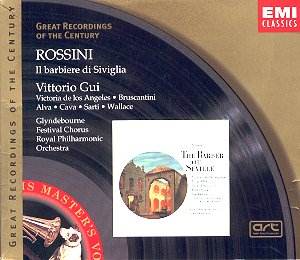This classic recording has hardly ever been out of
the catalogue since its first appearance. It has re-surfaced in various
formats, and now finds its true home in EMI’s Great Recordings of the
Century, at mid-price and on two discs. This gives it an immediate advantage
over other highly regarded sets, including Marriner, Chailly and Patané,
all on three discs, and still (as far as I know) at full price. Even
the excellent Naxos set is on three discs, so the price advantage is
all but wiped out. So, a famous two disc Barber, at mid-price,
in re-mastered stereo, with full text and translation. Cut and dried?
Not according to some.
In a recent survey of available recordings of this
opera, for Radio 3’s Building a Library, Christopher Cook
was rather dismissive of this version, finding Gui’s tempo ‘slow edging
towards the solemn’, and while he rightly praised Gui’s scholarly approach
to the score, he ultimately found that the conductor ‘sometimes takes
himself too seriously’. Another opera guide I have also has problems
with this version, concluding that it is finally let down by the supporting
cast.
To my ears, and knowing Gui’s equally famous Glyndebourne
recording of Mozart’s Marriage of Figaro, ensemble casting was
one of this conductor’s real strengths, and I find no weak links – at
all. As for tempi, it is true that one is slightly brought up short
by the slow(ish) speed for the overture. But some of this is surely
our familiarity with it as a concert piece, fizzing along and providing
a rousing start to a concert. Gui obviously viewed things differently,
seeing it more as an introduction to an unfolding series of dramatic
events. Besides, when the main Allegro kicks in, Gui is not really
that slow, and the final, long crescendo has a cumulative power
that is thrilling. He is actually only a few seconds short of Giulini’s
Philharmonia performance (on a disc of the overtures), once famous for
its breakneck tempo. It’s also here worth quoting from Richard Osborne’s
excellent booklet note, when he cites Gui’s protégé and
successor at Glyndebourne, John Pritchard, who said ‘As a young conductor,
I would think, as all young conductors occasionally think "Why
doesn’t he get a move on?" only to realise, as cascades of runs
ensued, how wise a practical and steady tempo had been from the outset’.
It’s all relative.
The singers are uniformly excellent, most of them having
sung together many times. Bruscantini, Wallace and Carva had all been
in the Glyndebourne revival of 1961; Luigi Alva and Victoria de los
Angeles were engaged at the insistence of the recording’s producer,
Victor Olof, though both were experienced Rossinians. The whole thing
gels beautifully from the start, and a real sense of ensemble, rather
than ‘star turns’, is evident. I particularly like Alva’s contribution
as Count Almaviva; this singer was a great stylist (as he proved in
the contemporaneous Giulini Don Giovanni) and his mellifluous legato
in the Act 1 trio ‘Se il mio nome saper voi bramate’,
is a joy. The buffo element is not over-played, though the wit
emerges effectively, and without caricature. Bruscantini is particularly
subtle, his famous ‘Largo al factotum’ containing not an ounce
of ‘ham’.
Rosina was a part de los Angeles was born to play.
Her lightness of vocal timbre and wicked, girlish sense of fun are a
delight. She also shared Gui’s prejudices in favour of authentic Rossini
stylishly performed. One of her favourite stories concerned the great
Adelina Patti. The young star had sung a highly decorated version of
‘Una voce poco fa’, the great opener to Act 1, scene 2, for Rossini
himself. His response was typically dry ‘Very nice, my dear. Who wrote
it?’
Anyone coming new to this opera can safely invest in
this set, knowing they will experience a glimpse of a great Rossini
tradition. The recording is slightly dry, with a small amount of tape-hiss,
but excellent balance between singers and the crisp orchestra (Beecham’s
RPO). I can do no more than quote the conclusion to Richard Osborne’s
note, ‘There exist many memorable recorded mementoes to John Christie’s
Glyndebourne, but few happier tributes than this to the spirit of the
place he helped create’.
Tony Haywood


